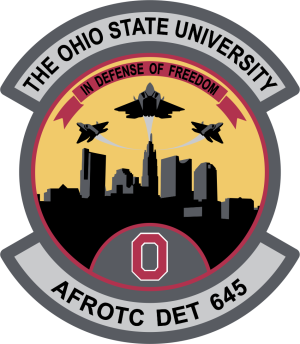
A Pathway to Officership and Service
There is one primary route to an Air Force or Space Force commission for college students through Air Force ROTC. That route is typically a four-year program. However, some variations do exist that are explained briefly below. Students attend AFROTC classes along with other college courses and normally receive elective academic credit.
After completing all requirements, the cadets are commissioned as Air Force or Space Force officers with a four-year active duty service commitment. Pilots, combat systems officers and air battle managers have longer commitments upon completing the specialized training.
Four-Year Program
The first two years of the four-year program, the General Military Course, consist of one hour of classroom work, two hours of leadership laboratory and three hours of physical conditioning each week. After completing the first two years' requirements, cadets who wish to compete for entry into the last two years of the program, the Professional Officer Course, must do so under the requirements of the Professional Officer Course selection system. This system uses qualitative factors such as grade point average, unit commander evaluation, aptitude and physical fitness test scores to determine a student's officer potential. After selection, students must complete a two-week summer field training program at Maxwell AFB before entering the Professional Officer Course.
The Professional Officer Course consists of three hours of classroom work, two hours of leadership laboratory and three hours of physical conditioning each week. Cadets apply what they have learned in the General Military Course and at field training. Cadets conduct the leadership laboratories and manage the unit's cadet corps. Each unit has a cadet corps based on the Air Force organizational pattern of flight, squadron, group and wing. Classes are small, with emphasis on group discussions and cadet presentations. Classroom topics include leadership, communication skills and national defense policy. Once enrolled in the Professional Officer Course, cadets are enlisted in the Air Force Reserve, assigned to the Obligated Reserve Section.
Varying-Year Program
While the typical track to commission is four years, some variations can be worked on a case-by-case basis. Two of the most common tracks are the two-and-a-half-year program and the three-year program. Both of those routes require dual enrollment for the General Military Course academic classes, so there is an increased academic course load during the first year in the program. Please contact us for further details to see if we can work out a track to meet your situation.
Medical Professions
Nursing majors may apply for an AFROTC scholarship and graduates agree to accept a commission in the Air Force Nurse Corps and serve four years on active duty after completing their licensing examination. Cadet premedical scholarship recipients who are accepted to medical school within one year of graduating may be sponsored in their pursuit of medical degrees.
Legal Professions
Both first- and second-year law students can apply for AFROTC scholarships. Students complete either a one- or two-year AFROTC program while attending law school.
Additionally, second-year law students can pursue an Air Force commission through AFROTC's graduate law program. This program guarantees judge advocate duty after a student completes all AFROTC, law school and bar requirements. After graduating from an American Bar Association-accredited law school, the student must be admitted to practice law before the highest state court of any state or federal court. The new lawyer is then commissioned into the Air Force in the grade determined by the laws and directives at the time of call to active duty.
Airman Commissioning Opportunities
AFROTC has four programs in which Air Force and Space Force enlisted members may pursue a commission
Scholarships for Outstanding Airmen to ROTC (SOAR) allows commanders to recognize outstanding Airmen by nominating them for an AFROTC scholarship in any major. The Airman Scholarship and Commissioning Program (ASCP) allows Airmen to compete for AFROTC scholarships while coordinating their application package with the AFROTC unit they are interested in attending. Although any major may be selected, technical areas and nursing are usually considered more favorably. Both SOAR and ASCP are available in two- to four-year lengths. To be eligible for a scholarship, Airmen and Guardians must be working on their first bachelor's degree and cannot exceed age limits as prescribed by public law.
The Professional Officer Course Early Release Program is available to Airmen and Guardians who may not be eligible or competitive for a scholarship due to age, degree program, or grade point average. Individuals compete for allocations while coordinating their application package with the AFROTC unit they are interested in attending.
These programs require the selected Airmen and Guardians to leave active duty to complete their degrees and meet Air Force and Space Force requirements necessary to earn a commission.
AFROTC also manages the Airmen Education and Commissioning Program. This program allows men and women of the Air Force and Space Force to remain on active duty while pursuing a baccalaureate degree at a college or university affiliated with AFROTC. After graduation, they attend Air Force Officer Training School and Basic Officer Training and receive their commission as a second lieutenant.
In addition, enlisted service members interested in becoming a registered nurse can apply for the Nurse Enlisted Commissioning Program or NECP. NECP is a two-year program that provides an advancement pathway for enlisted Airmen and Guardians to receive an active commission through the Nurse Corps. NECP is an opportunity for enlisted Airmen and Guardians to complete a full-time bachelor's degree in nursing at an accredited university while on active duty. Contact the chief nurse at the nearest active duty, Air National Guard or Air Force Reserve medical treatment facility for more information and guidance. Upon graduation and after passing licensure requirements, they attend Officer Training School and Basic Officer Training as a second lieutenant.